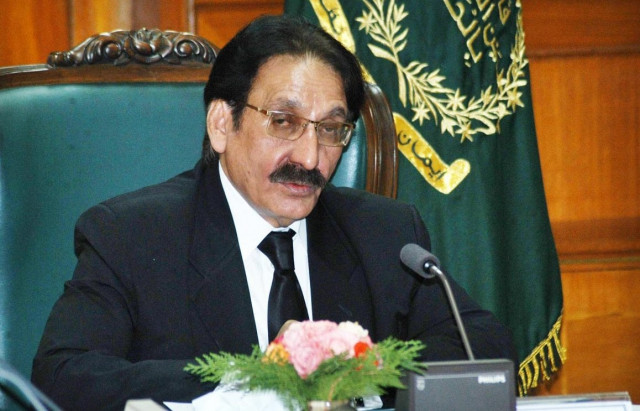Dual nationals can’t meddle in internal politics: CJ
Says Supreme Court cannot let foreign national attack constitutional institutions.

The chief justice said that Qadri’s loyalties come into question if he challenges the institutions of the country, despite being a Canadian national.
On the first day of the hearing, cleric Tahirul Qadri had come under judicial scrutiny after the apex court questioned his right as a stakeholder in Pakistan’s democratic system.
Things did not change much on Tuesday when the Supreme Court grilled the Minhajul Quran International (MQI) chief for “attacking a constitutional institution”.
Qadri, a famous cleric who also holds dual nationality, had moved the country’s top court seeking the reconstitution of the Election Commission of Pakistan (ECP) via a quo-warranto petition weeks after suddenly emerging from Canada and shaking up the country’s political landscape.
The three-judge bench, headed by Chief Justice Iftikhar Muhammad Chaudhry, remarked that his petition was filed under Article 184-3 and was not quo warranto, adding that a quo warranto does not come under their jurisdiction and Qadri should approach a high court before coming to the Supreme Court.
The stigma of dual nationality continued to haunt Qadri. The Supreme Court was not convinced he had the right to file the petition, but it did call his case a “unique” one.

“We cannot allow a dual citizen to interfere in internal politics in this way,” Chief Justice Chaudhry stated. “How can we accept your locus standi (right to appear), while no one from the real stakeholders sitting in Parliament has approached the court on this issue? Similarly none from the 180 million electors have ever shown grievance against the ECP.”
The chief justice said that Qadri’s loyalties come into question if he challenges the institutions of the country, despite being a Canadian national.
He said the court could not let a foreign national come to Pakistan at his will and “attack a constitutional institution” formed after years of efforts.
“You are touching an issue which attacks a constitutional institution.”
Calling him “Sheikhul Islam”, the chief justice said, “The doors of Parliament are closed for you and your interference in domestic politics is questionable.”
The bench observed that Qadri’s oath of allegiance to Queen Elizabeth was in direct conflict with Article 5 of the Constitution that requires loyalty to the state and obedience to the Constitution.
Justice Gulzar Ahmad, one of three judges hearing the case, asked Qadri, “How can we entertain a petition of a foreign nationality holder on strategic and defence related issues of the country?”

In response, Qadri said that he was not a foreigner and was originally a Pakistani. Being an elector or voter, he argued, he could question the functions of an institution that was responsible for holding elections.
Justice Gulzar Ahmad said that the apex court cannot show him any leniency on this issue because tomorrow a foreigner petitioner with divided loyalties could take the liberty of trying to interfere in important affairs of the country.
The MQI chief also submitted papers and a copy of his passport to the court to justify his right to file the petition. “If dual nationality divides loyalty, then the Constitution of Pakistan should take notice of it,” Qadri said.
The chief justice said, “The problem is that outside Pakistan you are a Canadian, while a Pakistani should be a Pakistani everywhere.”
In response, Qadri submitted a statement saying that he only used his Canadian passport for worldwide travelling. He contended that a Pakistani passport was problematic for him to visit other countries in a scholar’s capacity for various conferences and seminars.
Justice Chaudhry replied, “We also face similar problems but we did not avail the nationality of another country. We should be proud to be Pakistanis.”
When the chief justice questioned the basis on which Qadri had filed his petition, the MQI chief said that he was a Pakistani citizen and could renounce his citizenship any time. Without issuing a ruling yet, the case was adjourned and will resume the hearing today (Monday).
Published in The Express Tribune, February 13th, 2013.



















COMMENTS
Comments are moderated and generally will be posted if they are on-topic and not abusive.
For more information, please see our Comments FAQ